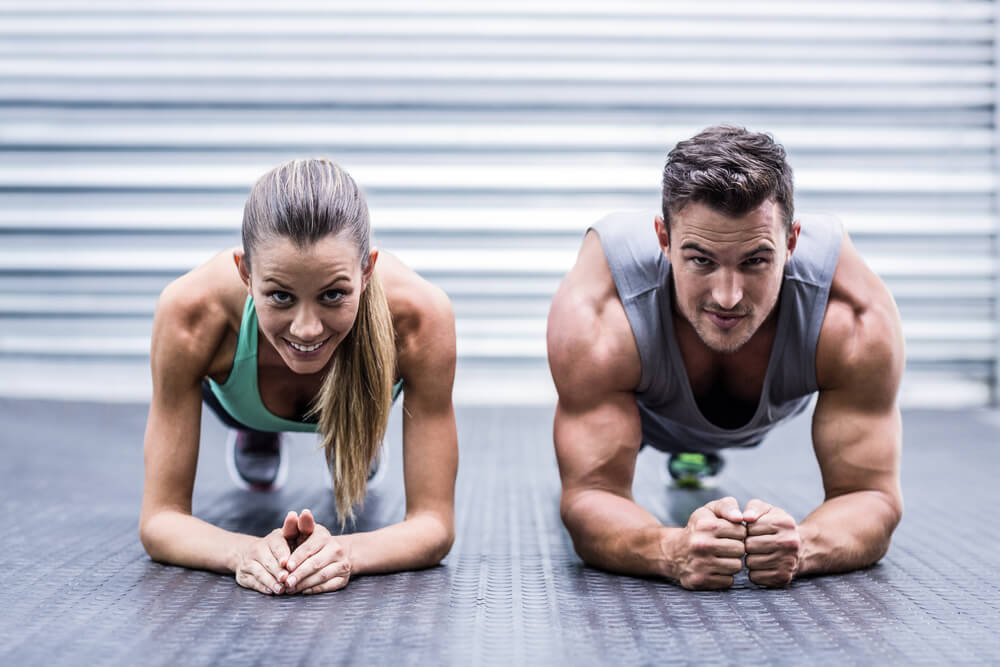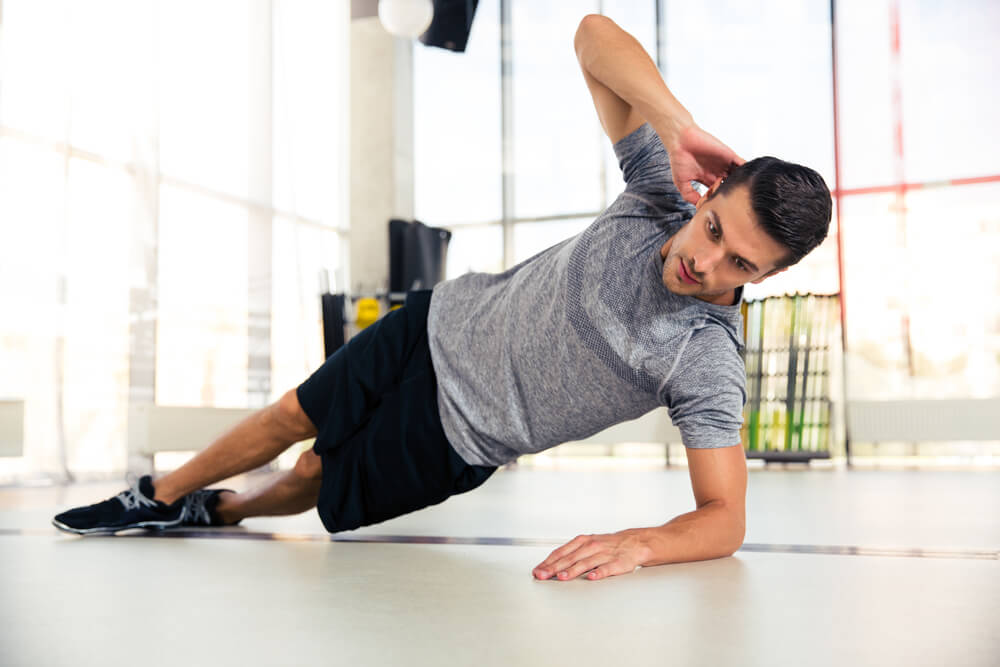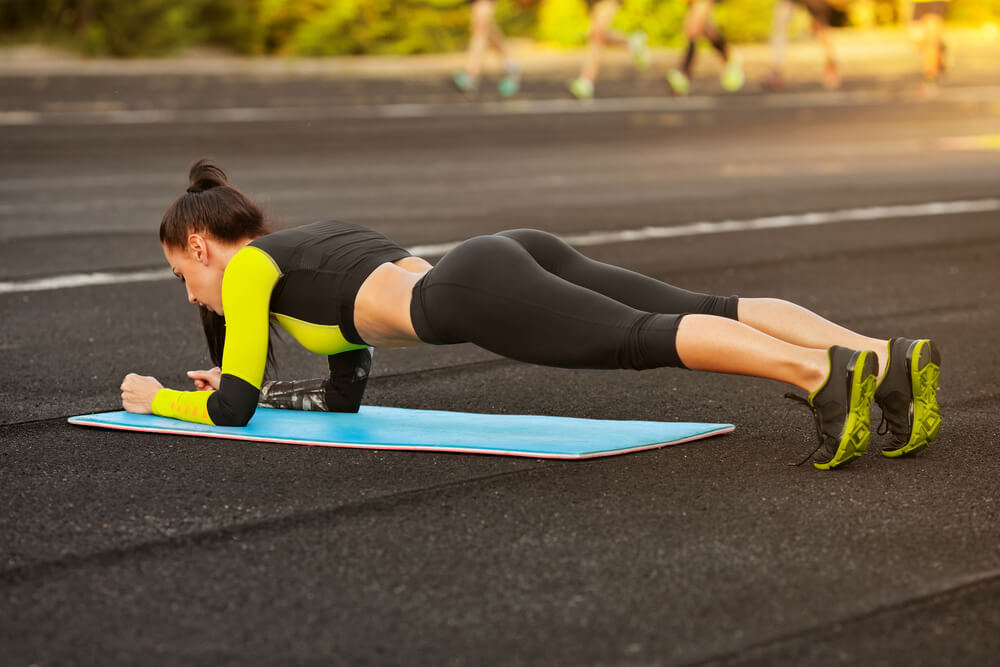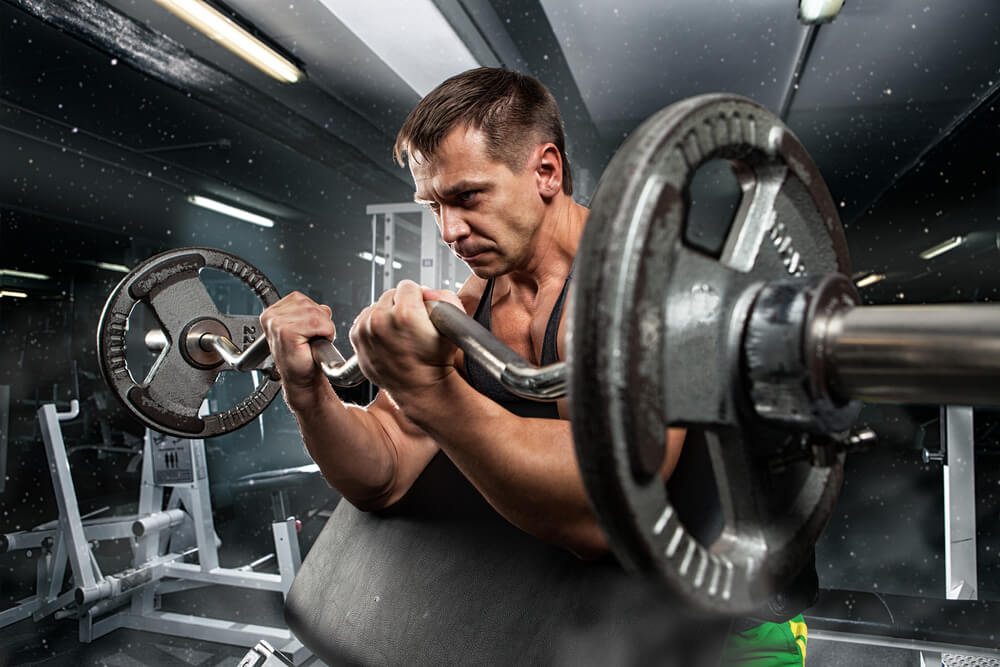
These days, everyone seems to be looking for a quick fix when it comes to fitness.
The result is a never-ending parade of complex and ridiculous products and promises that are intended to prey on the weak-minded who want to avoid hard work to get results. The good news is that losing weight, building a six pack and getting healthy can be easy.
How? Simple. Try the plank.
The plank is a prime example of how something simple can result in the greatest gains to your fitness levels. When you think about the move, it doesn’t really seem like much. You aren’t moving, pushing, pressing or twisting. You’re just holding on. Sounds easy, doesn’t it? While getting into the proper form to see the benefits of this easy exercise is straightforward, holding the position takes strength and endurance in your abs, back and core (the muscles you’d expect), while it also works your glutes and hamstrings, supports proper posture and improves balance.
The Basics
Before we get ahead of ourselves with all the many benefits of the plank, you need to first know how to do the move properly to see any kind of favorable health benefits. Let’s make this as simple as the exercise appears.
How to Perform a Basic Plank
- Hold your elbows directly under your shoulders and place your wrists in line with your elbows.
- Push your body up into your upper back and hold your chin close to your neck (like you’re holding an egg between your chin and your throat).
- In this position, brace your abdominals—contract them like you would if you were expecting a punch in your stomach, squeeze your gluteal (tailbone) and thigh muscles simultaneously while continuing to breathe normally.
- Hold a plank at least 60 to 90 seconds. A lot of folks will tell you to hold the plank longer if you can, but when you’re using correct form, it is not necessary to hold it for longer than this amount of time. Rest for approximately 30 seconds and repeat three to five more times.
Benefits of Planking
Now that you know how to perform the perfect plank, let’s revisit all the many health benefits you’ll enjoy once you put this move into your daily routine.
#1 It Burns Tons Of Calories
Planking engages multiple muscle groups simultaneously, but it also strengthens the core muscles that are the foundation to many multi-joint exercises. Engaging more muscles means burning more calories so if you want to lean down, the plank is essential.
#2 Reduce Back Pain
Planks work for back pain because they strengthen your core, which has the pleasant side effect of reducing back pain. They also strengthen your back muscles—especially those in your upper back. Because the plank exercise requires minimal movement while contracting all layers of the abdominal fascia, it is also an excellent way to strengthen the core, which, in turn, helps reduce low-back pain.
#3 Improve Flexibility
While building strength, planks also increase flexibility in your posterior muscle groups. The muscles around your shoulders, collarbone, and shoulder blades will expand and stretch (an area that often receives little attention), as will your hamstrings and even the arches of your feet and your toes.
If you do a side plank, you can also stretch out your sides (especially if you extend your arm up over your head in line with your body).
#4 Improve Your Balance and Posture
To do a plank correctly, you must engage your abs to stay upright. Side planks or planks with extensions are particularly beneficial for building balance, as are planks performed on a stability ball. To test and strengthen your balance, you could try a side plank with a leg raise. In addition, planks work all the muscles you need to maintain proper posture, like your back, chest, shoulders, abs and neck. If you do planks regularly, you’ll find you’re able to sit or stand up straighter with ease.

How to Fix the Most Common Planking Mistakes
Still not sure if you’re doing it all according to the form tips above? Don’t worry. Here are some simple solutions to the most common mistakes I see when people try the plank.
The Mistake: Collapsing the lower back
The Fix: Instead of compromising the lower back by dipping your butt, engage your core by imagining your belly button pulling in toward your spine. This will help keep your torso flat, and, in turn, your spine safe.
The Mistake: Your butt is too far up and out of line with the rest of your body
The Fix: To really get your core working the way it should in the plank position, keep your back flat enough so your abs feel engaged from top (right below the sternum) to bottom (directly below the belt). This will ensure your butt isn’t too high, but remember not to let your tush go too far toward the ground.
The Mistake: Letting your head drop
The Fix: While the focus may be on keeping your hips, butt and back in the proper position, form isn’t only about the core and the lower body in this move. It’s important to think of your head and neck as an extension of your back. Keep your eyes focussed on looking straight down, no looking around at surrounding distractions and no closing your eyes.
The Mistake: Forgetting to breathe
The Fix: It’s human nature to hold your breath when in a strenuous position for a period of time. Denying yourself oxygen, however, can bring on dizziness or nausea, which are unpleasant at best and dangerous at worst. Always retain a steady breathing pattern throughout the plank.
The Mistake: Focusing too much on the stopwatch
The Fix: Quality trumps the quantity of seconds ticking away when it comes to the plank. When your form begins to suffer, it’s time to call it quits. If your back begins to bow or your shoulders start to sink in, take a break.
With all the benefits I’ve listed and the tips on how to best perform this simple move, the plank is definitely going to become a staple of your workout, if it wasn’t already. But, the problem with a simple move like this is that it can get boring and, if you do it a lot and do it right, you can grow beyond the level of its effectiveness. What should you do if you’ve outgrown the plank or just want to try something different for variety?
We thought you’d never ask!
Here are some easy variations to try that offer the same benefits with a heck of a lot of added intensity as well!
#1Side Plank
- – Lie on your side with your legs straight and your body in a straight line (shoulders and hips stacked one on top of the other; don’t lean forward or backward)
– Lift your body so that your hips are off the floor and rest your weight on the elbow that’s touching the floor
– Only your forearm and feet should touch the floor
– Do not let your hips sag—as you get tired, you’ll want to drop your hips, but focus on keeping them stationary
#2 Walking Plank
- – Get into a push-up position with your arms extended
– Keep your feet in a fixed position
– Walk on your hands for one to three feet towards the right, then switch and walk towards your left
– Keep your belly pulled in throughout the movement
#3 Spiderman Plank
- – Get into a plank position
– Bring your right knee towards your right elbow
– Switch and bring your left knee towards your left elbow
– Hold on each side and repeat 10 times on each side
#4 Alternating Hand Plank
- – Get into a plank position
– Push up onto your right hand until your right arm is straight
– Push up onto your left hand until your left arm is straight
– Lower back down onto your right forearm and then your left forearm (that’s one rep)
– Do not allow your hips to move as you lift and lower

Advanced Planks with Accessories
Adding an unstable surface to your planks is one of the most challenging and fun variations you can perform. It will add intensity and it will challenge your core to the max. But make sure you master the basic plank first before trying out any of these advanced exercises.
#1 Stability Ball Plank
You can buy a stability ball or Swiss ball at any sports equipment store or you could also go to pretty much any gym and use the ones they have available. All the normal plank rules apply: Keep a straight line from head to ankles, back straight and shoulders not up by ears.
Not difficult enough? No problem. Just elevate one foot from the floor. The combination of an unstable surface and one less point of contact will make for the most grueling 30 seconds of your life.
#2 Body Saw
For the body saw, set up in a plank position but place your feet on a stability ball or in a suspension trainer. If you don’t have those, you could try furniture sliding pads or even just a pair of paper plates—seriously!
Once you’re in position, slowly begin moving your body forward and backward using your forearms. Similar to a barbell rollout or ab roller, the movement will become much more difficult the farther your elbows are from the center of your body.
#3 Roll-outs
The roll out is similar to the body saw, except that your arms are on the ball or suspension trainer. If using a ball, place your forearms on top like you would for a traditional plank. Next, begin slowly rolling the ball out in front of you, reversing the movement when it becomes too difficult to hold or your lower back feels like it is about to cave. Rolling the ball out just six to ten inches should do the job.
If you use a suspension trainer, you can make the roll out much more difficult, because you have a greater range of possible motion. Grab the handles and follow the same steps as on the ball, pressing your arms out in front of you slowly. If you’re strong enough, you might even be able to push the handles all the way out so your arms are totally straight.
By Michael Seril, MS
Terry
Latest posts by Terry (see all)
- How Important Are Net Carbs For Building Huge Muscle? - Apr 28, 2017
- The Matt Damon Workout Explained - Apr 27, 2017
- Watercress – Benefits And The Best Way To Consume It - Apr 26, 2017











[…] Featured photo credit: Gymjunkies.com via gymjunkies.com […]
[…] also the classic plank, which is an isometric exercise intended to target your body’s core. It is extremely popular, but […]
[…] When you feel satisfied with your workout, finish it with a one-minute plank. […]
[…] When you feel satisfied with your workout, finish it with a one-minute plank. […]
[…] When you feel satisfied with your workout, finish it with a one-minute plank. […]